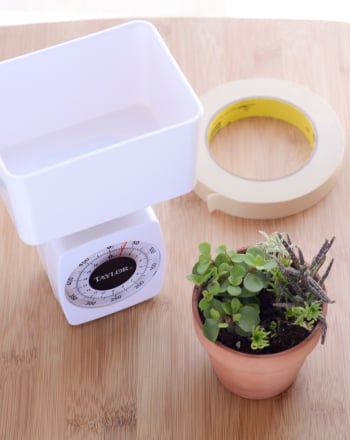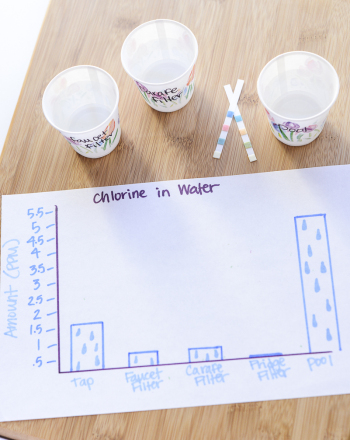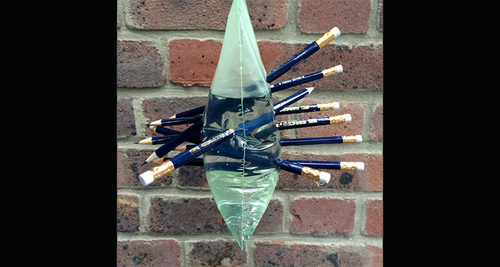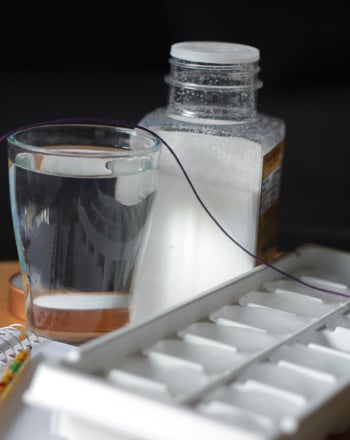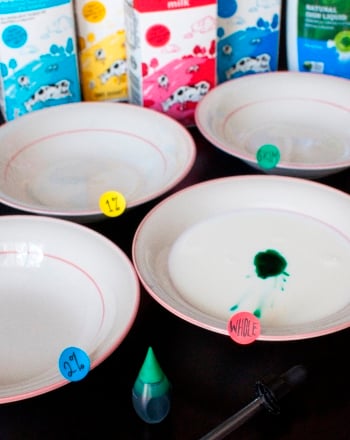Science project
Electrolysis of Water Experiment
Energy is stored in the bonds of molecules. When these bonds split apart, the energy released can be used to do work. Breaking apart liquid water molecules into hydrogen and oxygen gas creates an enormous amount of energy, which can be turned into useful electricity to power our homes and cars.
To break these bonds, some amount of energy is required to get the atoms in water molecules active enough to break apart from each other. At home, we can supply this energy with a battery. All batteries have two terminals, or ends: a positive terminal and a negative terminal. The water then connects these terminals, so energy can flow between them. As the electricity passes through the water, it splits the water!
Pure water itself is not a good conductor of electricity, so for this experiment baking soda will be added to make the solution an electrolyte. An electrolyte is a part of a solution that can be broken up by electrolysis. Electro refers to energy and electricity and -lysis refers to splitting apart. Electrolytes are important both in batteries and in our bodies!
Problem
During the electrolysis of water, which electrolyte conducts electricity the best?
Materials

- Distilled water
- Tap water
- 2 silver-colored thumb tacks
- 9V battery
- Small, clear plastic container (a plastic to-go sauce container from a restaurant would work great)
- 2 test tubes
- Stopwatch
- Baking soda
- Table salt
- Lemon
- Dishwashing detergent
Procedure
- Insert the thumb tacks into the bottom of the plastic container so that the points push up into the container. Space them so that they’re the same distance apart as the two terminals of the 9V battery. Be careful not to prick yourself!
- Place the plastic container with the thumb tacks over the terminals of the battery. If the cup is too large to balance on the battery, find something to stack it on: between two books, a stack of post-its, etc.
- Slowly fill the container with distilled water. If the tacks move, go ahead and use this opportunity to fix them before you proceed. Will distilled water conduct electricity on its own? Try it!
- Add a pinch of baking soda.
- Hold two test tubes above each push pin to collect the gas being formed. Record your observations. What happens? Does one tube have more gas than the other? What gases do you think are forming?
- Discard the solution, and repeat the procedure with a different combination:
- Distilled water and lemon juice
- Distilled water and table salt
- Distilled water and dish detergent
- Distilled water (no additive)
- Tap water (Does tap water work? If so, why?)
Results
Distilled water will not conduct current, while tap water will conduct a small current. The solution with baking soda will facilitate a good amount of electrolysis. The solution with table salt will facilitate electrolysis the best.
Why?
Baking soda, known by chemists as sodium bicarbonate (NaHCO3), isn’t an electrolyte on its own. Remember—it needs to be in a solution! When dissolved in water, it lets current flow through the water between the terminals of the battery. In the water-baking soda solution, the gases that are produced are hydrogen (H2), oxygen (O2) and carbon dioxide (CO2).
Table salt, or sodium chloride (NaCl), is also a good additive to form electrolytes. In water, salt actually splits into Na+ and Cl- ions, which are very good at carrying current, or the flow of electric charges. In the water-salt solution, the gases that are produced are hydrogen, oxygen and chlorine gas (Cl2)—you don’t want to inhale this stuff!
Lemon juice is a decent electrolyte because it is an acid. The acid dissociates in water and the current will be carried by the ions. Distilled water on its own will not carry any current. However, tap water is often able to conduct current because of minerals and impurities (Don’t worry! These things are not bad for you!).
Different amounts of gas are produced from each reaction because each reaction will carry a different amount of current. The amount of gas produced is directly proportional to the current that flows in the system.
Education.com provides the Science Fair Project Ideas for informational purposes only. Education.com does not make any guarantee or representation regarding the Science Fair Project Ideas and is not responsible or liable for any loss or damage, directly or indirectly, caused by your use of such information. By accessing the Science Fair Project Ideas, you waive and renounce any claims against Education.com that arise thereof. In addition, your access to Education.com's website and Science Fair Project Ideas is covered by Education.com's Privacy Policy and site Terms of Use, which include limitations on Education.com's liability.
Warning is hereby given that not all Project Ideas are appropriate for all individuals or in all circumstances. Implementation of any Science Project Idea should be undertaken only in appropriate settings and with appropriate parental or other supervision. Reading and following the safety precautions of all materials used in a project is the sole responsibility of each individual. For further information, consult your state's handbook of Science Safety.



